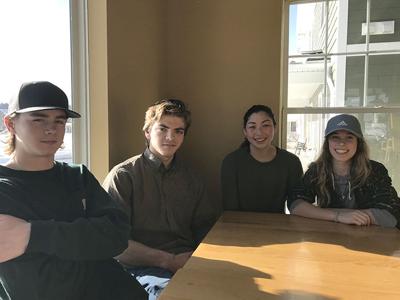The topic of sexual assault and harassment has dominated the news over the last few months, involving everyone from the president down to local high school students. Although the subject isn’t always comfortable for teens or adults to discuss, a group of Champlain Valley Union High School students is working toward eliminating issues of sexual violence, harassment, and inappropriate behavior by starting with the source: the kids themselves.
The Student ACT group, which stands for Student Awareness, Curriculum and Training consists of 15 students — roughly half boys and half girls — whose goal is to create a grassroots movement fostering an attitude of change within the student body that empowers students to not only change their thinking in regard to what is acceptable behavior, but to feel comfortable speaking up when other students’ behavior is inappropriate or dangerous. These days, that means both online and in person.
Ryan Trus is a senior; along with Chiara Antonioli, Walter Braun and Iris Mann, he is a founding member of Student ACT. Trus said that while they have many avenues for delivering their message, the goal for all of their efforts is the same: “The idea is to create more of a community of accountability within the students themselves and not rely on the infrastructure of the school,” he said. By drawing in students from different cliques, activities, and sports, the Student ACT leaders say they are purposefully engaging kids from all corners of high school life.
The group has several faculty advisors and partnered with Hope Works, a local nonprofit that focuses on issues of sexual violence. By educating their peers about the spectrum of issues and behaviors that fall into the broad category of sexual violence and harassment, and providing avenues of support for victims, the students say they hope to create a grassroots movement to curb the problem.
The club meets Wednesdays before school. They recently spent a weekend at a training at Hope Works, which is similar to the training a college resident assistant would receive. CVU faculty will also go through this training in February. They also have made posters to hang in school hallways and restrooms, and they are brainstorming to come up with strategies to make sure their efforts last well beyond their senior year.
Along with Hope Works, Student ACT is bringing a workshop to all CVU freshmen this spring that focuses on sexting and online sexual harassment, an issue that’s pervasive whether you’re a theater kid or a jock.
Trus said that he and Braun plan to focus on reaching out to student athletes, particularly boys — who, he said, are stereotypical perpetrators. He said their goal is to educate other male athletes about harassment, including inappropriate smartphone and social media behavior. They are both captains of the lacrosse team, and acknowledge that the proverbial “locker room talk” is, in fact, an issue.
Trus said he remembers being an underclassman and hearing athletes talking inappropriately in the locker room; he also remembers hearing older students admonishing their teammates and saying, “‘Hey, that’s not okay,’” he said. The impact this had on him as a younger student is one he hopes all older students will have on their younger peers.
This is an ambitious agenda for a brand-new group conceived by one member as his Grad Challenge project. He brought the idea to student advisor and lacrosse coach Tim Trevithick last spring, who steered him toward principal Adam Bunting. The principal helped him form the club.
The Vermont Youth Risk Behavior Survey, which is administered by the Vermont Department of Health and the Vermont Agency of Education, is given yearly to high school students. Results from the 2015 survey are the latest available. It found that among all Vermont high school students, 7 percent said they “have ever been physically forced to have sexual intercourse when they did not want to.” This is just one facet of the many challenging situations students face and it can be a hard reality for parents and administrators to accept.
Bunting is acutely aware of the issues. “Do I think CVU is an exception? Absolutely not. We’re typical,” he said.
But Bunting said that vocal students and parents who are willing to face difficult situations can help foster a supportive environment. “It’s normalizing the discussion and making it okay for young women and young men to be able to talk about vulnerability, times when they’ve needed support, and times and situations when they felt compromised,” he said.
Though the students have received some pushback from parents and faculty who aren’t convinced that these programs are necessary, Antonioli said that discomfort is part of the process. Overall, she said, the discussion is engaging people who otherwise might have shied away from the subject. “A lot of parents asked if they can be involved,” she said. “They see that it needs to be addressed.”
Mann said she sees that their efforts are already paying off. “People are talking about it, and that’s the difference I’ve noticed, and I really appreciate it,” she said. “Even when it’s a hard discussion, I feel safer.”













(0) comments
Welcome to the discussion.
Log In
Keep it clean. Please avoid obscene, vulgar, lewd, racist or sexual language.
PLEASE TURN OFF YOUR CAPS LOCK.
Don't threaten. Threats of harming another person will not be tolerated.
Be truthful. Don't knowingly lie about anyone or anything.
Be nice. No racism, sexism or any sort of -ism that is degrading to another person.
Be proactive. Use the "Report" link on each comment to let us know of abusive posts.
Share with us. We'd love to hear eyewitness accounts, the history behind an article.